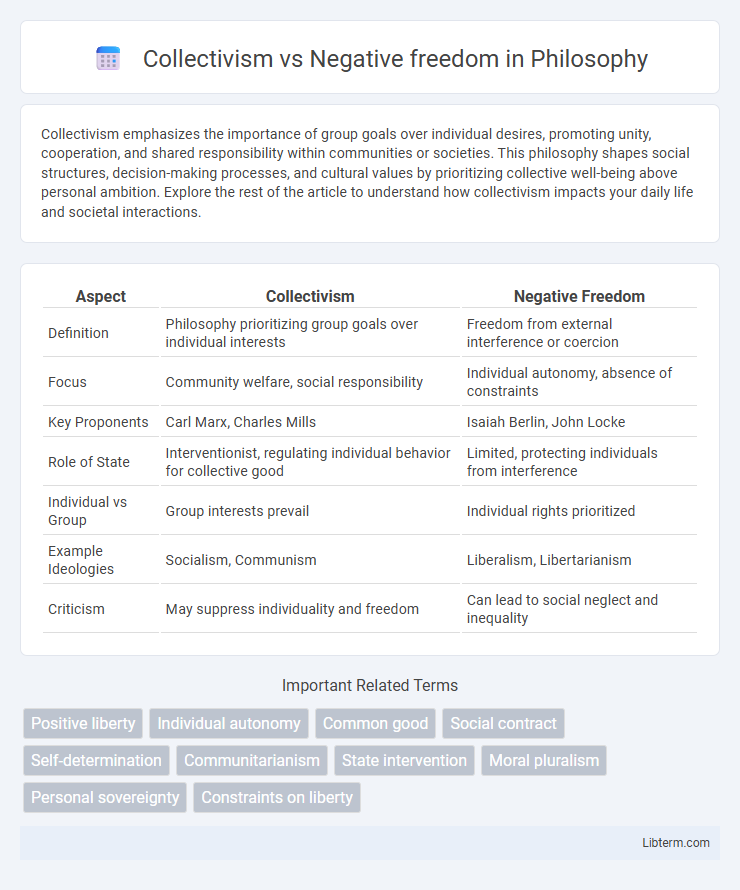Collectivism emphasizes the importance of group goals over individual desires, promoting unity, cooperation, and shared responsibility within communities or societies. This philosophy shapes social structures, decision-making processes, and cultural values by prioritizing collective well-being above personal ambition. Explore the rest of the article to understand how collectivism impacts your daily life and societal interactions.
Table of Comparison
| Aspect | Collectivism | Negative Freedom |
|---|---|---|
| Definition | Philosophy prioritizing group goals over individual interests | Freedom from external interference or coercion |
| Focus | Community welfare, social responsibility | Individual autonomy, absence of constraints |
| Key Proponents | Carl Marx, Charles Mills | Isaiah Berlin, John Locke |
| Role of State | Interventionist, regulating individual behavior for collective good | Limited, protecting individuals from interference |
| Individual vs Group | Group interests prevail | Individual rights prioritized |
| Example Ideologies | Socialism, Communism | Liberalism, Libertarianism |
| Criticism | May suppress individuality and freedom | Can lead to social neglect and inequality |
Understanding Collectivism: Core Principles
Collectivism emphasizes the group's well-being over individual interests, advocating shared ownership, cooperation, and collective decision-making to achieve social harmony and equality. Core principles include the prioritization of community goals, interdependence among members, and redistribution of resources to reduce inequality. This ideology contrasts with negative freedom by limiting individual autonomy to ensure collective rights and social cohesion.
Defining Negative Freedom: Key Concepts
Negative freedom is defined as the absence of external constraints or interference, allowing individuals to act according to their own will. It emphasizes personal autonomy, where freedom is seen as non-intervention by others or the state. This contrasts with collectivism, which prioritizes group goals and may advocate for limiting individual freedoms to benefit the community.
Historical Roots of Collectivism
Collectivism traces its historical roots to ancient communal societies and philosophical traditions like Confucianism and Marxism, emphasizing the group's welfare over individual autonomy. It emerged prominently during the Industrial Revolution as a response to rampant individualism and economic inequality, promoting cooperative ownership and social responsibility. These foundations contrast sharply with the concept of negative freedom, which prioritizes individual liberty free from external constraints.
Origins and Evolution of Negative Freedom
Negative freedom originated from classical liberalism, emphasizing individual autonomy free from external constraints imposed by society or government. Evolving through the 17th and 18th centuries, thinkers like John Locke and Isaiah Berlin shaped its modern interpretation as freedom from interference, contrasting collectivist ideals that prioritize communal goals. Over time, negative freedom has influenced legal and political frameworks by advocating protection of personal rights against collective encroachments.
Individual Rights in Collectivist Societies
In collectivist societies, individual rights are often subordinate to the goals and values of the group, emphasizing social harmony and collective well-being over personal autonomy. This framework can limit negative freedom, defined as the absence of external constraints, since individuals may face restrictions to maintain group cohesion and societal order. However, collectivism promotes interconnected responsibilities, where personal freedoms are balanced against community obligations to ensure mutual support and stability.
Social Welfare and Personal Autonomy
Collectivism emphasizes social welfare by prioritizing communal support systems and equitable resource distribution to ensure collective well-being, often advocating for government intervention in healthcare, education, and social security. Negative freedom centers on personal autonomy, highlighting the absence of external constraints and the individual's right to make decisions without coercion or interference. Balancing collectivism and negative freedom requires addressing the tension between societal obligations and protecting individual liberties in policy-making.
Economic Implications: Collectivism vs Negative Freedom
Collectivism emphasizes shared economic ownership and state intervention to ensure equitable resource distribution, often resulting in comprehensive welfare systems and reduced income inequality. Negative freedom prioritizes individual economic autonomy with minimal government interference, fostering competitive markets and private property rights. The economic implications of collectivism tend to support social safety nets and collective responsibility, whereas negative freedom encourages innovation and personal financial liberty through deregulated markets.
Political Systems: Balancing Freedom and Community
Collectivism emphasizes the role of the community and state in promoting social welfare, often prioritizing collective rights over individual autonomy to achieve equity and social justice. Negative freedom, defined as freedom from external interference, is central to liberal democracies that safeguard individual liberties through constitutional rights and limited government intervention. Political systems struggle to balance collectivist policies advocating for social cooperation with protecting negative freedom to prevent authoritarian overreach and maintain personal autonomy.
Criticisms and Challenges of Both Approaches
Collectivism faces criticisms for potentially suppressing individual autonomy and stifling personal initiative by prioritizing group goals over personal freedoms. Negative freedom, emphasizing non-interference, is challenged for neglecting social inequalities that hinder individuals' genuine ability to act freely. Both approaches struggle to balance individual rights with social responsibilities, often leading to tensions between personal liberty and collective welfare.
Toward a Harmonious Society: Finding Middle Ground
Collectivism emphasizes social cohesion and shared responsibility, whereas negative freedom prioritizes individual autonomy free from external constraints. Toward a harmonious society, balancing collective well-being with personal liberties fosters mutual respect and inclusive governance. Integrating community-focused policies with protections for individual rights promotes social stability and freedom simultaneously.
Collectivism Infographic

 libterm.com
libterm.com